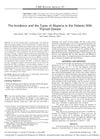 September 2022 in “Journal of Case Reports and Medical History”
September 2022 in “Journal of Case Reports and Medical History” Many new moms lose hair after childbirth due to hormonal changes, but it usually grows back within a year.

Hair loss can be caused by hormones, illness, autoimmune disorders, or vitamin deficiencies, and treatments vary depending on the type.
[object Object] 
Baldness is often hereditary and linked to male hormones, becoming noticeable when half the hair is lost.
 May 2009 in “Endocrinologist”
May 2009 in “Endocrinologist” Women with thyroid disease are more likely to experience female pattern hair loss, especially if they've had thyroid disease for a long time.
 24 citations,
December 2011 in “Journal of The American Academy of Dermatology”
24 citations,
December 2011 in “Journal of The American Academy of Dermatology” Caucasian hair is denser, but Asian hair is thicker in female pattern hair loss patients.
 32 citations,
March 2021 in “Journal of endocrinological investigation”
32 citations,
March 2021 in “Journal of endocrinological investigation” Thyroid hormones are important for skin health and changes in them can affect conditions like hair loss and eczema.
26 citations,
October 2002 in “Journal of Investigative Dermatology” A specific gene mutation causes congenital hair loss.
 24 citations,
July 1987 in “Dermatologic Clinics”
24 citations,
July 1987 in “Dermatologic Clinics” Systemic diseases can cause hair loss, which is often reversible with treatment.
 19 citations,
January 2016 in “Dermatology Research and Practice”
19 citations,
January 2016 in “Dermatology Research and Practice” The study concluded that hair loss in Indian women is not significantly linked to anemia or thyroid problems, but checking thyroid function could help those with ongoing hair loss.
 18 citations,
October 1984 in “International Journal of Dermatology”
18 citations,
October 1984 in “International Journal of Dermatology” Lithium therapy may cause temporary hair loss, with possible regrowth if treatment is stopped or continued.
 17 citations,
April 2016 in “Journal of Investigative Dermatology”
17 citations,
April 2016 in “Journal of Investigative Dermatology” KB2115 (eprotirome) can safely extend the hair growth phase without damaging cells or changing hair color.
 2 citations,
January 2023 in “Journal of Clinical Medicine”
2 citations,
January 2023 in “Journal of Clinical Medicine” People with hair loss conditions may also have thyroid disorders, but more research is needed to understand the connection.
2 citations,
June 2016 in “Düşünen Adam” Venlafaxine can cause hair loss, which stops after discontinuation.
1 citations,
August 2021 in “Journal of Cosmetic Dermatology” Female pattern hair loss is more common in rural areas among secondary school girls.
 1 citations,
October 2020 in “PubMed”
1 citations,
October 2020 in “PubMed” Hormone testing may not be very helpful in diagnosing female pattern hair loss.

Teprotumumab for thyroid eye disease commonly causes fatigue, brittle nails, dry eyes, hair loss, muscle spasms, and dry mouth, with rare serious events like blood clots.
 May 2023 in “Archives of dermatological research”
May 2023 in “Archives of dermatological research” Some factors like thyroid disease, diabetes treatment, hair dryers, natural hairstyles, and scalp conditions can affect the treatment results for a hair loss condition called CCCA.
 September 2020 in “Osmangazi tıp dergisi”
September 2020 in “Osmangazi tıp dergisi” Thyroid dysfunction, vitamin D and B12 deficiencies, and iron deficiency may be linked to hair loss condition Telogen Effluvium.
 January 2022 in “Clinical Cases in Dermatology”
January 2022 in “Clinical Cases in Dermatology” The document suggests a possible link between hair loss and thyroid cancer, but doesn't provide definite proof.
[object Object]  July 2019 in “Journal of The American Academy of Dermatology”
July 2019 in “Journal of The American Academy of Dermatology” Lab tests for female hair loss have unclear usefulness; consider based on symptoms.
 August 2002 in “Zeitschrift für Hautkrankheiten”
August 2002 in “Zeitschrift für Hautkrankheiten” Female pattern hair loss affects crown, increases with age, and has limited treatments.
 6 citations,
October 2012 in “BMJ”
6 citations,
October 2012 in “BMJ” The woman's hair loss was mainly due to stress and low iron levels, and her hair grew back after treatment.
 3 citations,
February 2020 in “International journal of women’s dermatology”
3 citations,
February 2020 in “International journal of women’s dermatology” Most women with hair loss take more supplements than average, but these often don't help and can be risky and costly.
 November 2023 in “International Journal of Trichology”
November 2023 in “International Journal of Trichology” No significant link between hair loss and iron or thyroid levels was found, but checking for deficiencies might still be useful.
 May 2024 in “Drug discovery today”
May 2024 in “Drug discovery today” Thyroid receptor β can help develop new drugs to treat hair loss.
 36 citations,
November 2018 in “American Journal of Clinical Dermatology”
36 citations,
November 2018 in “American Journal of Clinical Dermatology” Alopecia is linked to various health and mental conditions, impacts life quality, and needs medical attention beyond its cosmetic effects.
 2 citations,
January 2014 in “Türkiye klinikleri tıp bilimleri dergisi”
2 citations,
January 2014 in “Türkiye klinikleri tıp bilimleri dergisi” Thyroid autoimmunity may be involved in some female hair loss, suggesting the need to test for thyroid antibodies in these patients.
 February 2024 in “Folia Medica”
February 2024 in “Folia Medica” Platelet-rich plasma treatment is effective for hair loss in patients regardless of their thyroid antibody levels.
 March 2014 in “Journal of The American Academy of Dermatology”
March 2014 in “Journal of The American Academy of Dermatology” Vitamin D deficiency is common in temporary hair loss, and stress is often a suspected cause.

Most men seeking hair transplants have Male Pattern Baldness, influenced by genetics, age, and testosterone, while women's hair loss can be affected by thyroid function, iron, testosterone, prolactin, ferritin levels, and certain conditions. Follicular Unit Extraction is a popular hair transplant technique.



























